
Guests
- Juan PappierAmericas deputy director at Human Rights Watch.
- Juan Gonzálezco-host of Democracy Now!
Defense Secretary Pete Hegseth has announced the launch of Operation Southern Spear to target suspected drug traffickers in South America, Central America and the Caribbean. The U.S. now has 15,000 military personnel in the region. Over the past two months, the U.S. has blown up at least 20 boats in the Caribbean and eastern Pacific. “Eighty people have been killed in what are extrajudicial executions under international law,” says Juan Pappier, Americas deputy director at Human Rights Watch. The Pentagon claims the boats were carrying drugs, but officials have acknowledged they don’t know who has been killed.
“Progressives and people of goodwill of the U.S. and Puerto Rico, it’s time for those of us here to stand up and say that we will not support any attempt to bring back the old gunboat diplomacy and to invade another Latin American country. And we need to do it soon, because this stuff is moving very quickly,” says Democracy Now!’s Juan González.
Transcript
AMY GOODMAN: Defense Secretary Pete Hegseth has announced the launch of Operation Southern Spear to target suspected drug traffickers, he says. In a post on X, Hegseth wrote, quote, “Today, I’m announcing Operation SOUTHERN SPEAR. Led by Joint Task Force Southern Spear and @SOUTHCOM, this mission defends our Homeland, removes narco-terrorists from our Hemisphere, and secures our Homeland from the drugs that are killing our people,” unquote.
The announcement comes as the Pentagon continues to amass warships in the Caribbean. The USS Gerald R. Ford aircraft carrier arrived earlier this week. The U.S. now has 15,000 military personnel in the region. It’s the largest buildup in the region in decades, according to The New York Times.
Over the past two months, the U.S. has blown up at least 20 boats in the Caribbean and eastern Pacific. The latest strike killed four people on Thursday. The Pentagon claims the boats were carrying drugs, but officials have acknowledged they don’t know who’s been killed. Critics have denounced the strikes as illegal extrajudicial killings.
We begin today’s show with Juan Pappier, the Americas deputy director at Human Rights Watch.
We welcome you to Democracy Now!, Juan. Begin by talking about Operation Southern Spear and what this means.
JUAN PAPPIER: Amy, thank you for having me.
We don’t know what Operation Southern Spear means. The secretary has not provided details. But we have every reason to be concerned, because in the buildup of this announcement, as you mentioned, 80 people have been killed in what are extrajudicial executions under international law.
There is no denying that the problem of narcotics in the United States and the problem of organized violence in Latin America are serious, but they’re not armed conflicts, and the U.S. government cannot pretend otherwise to circumvent its obligations under international law. The U.S. government cannot strike boats as it pleases. These are extrajudicial executions, which are grave violations.
JUAN GONZÁLEZ: And, Juan, isn’t it true that most of the drugs that come into the United States, whether it’s fentanyl or cocaine, come through Mexico? And yet, the Trump administration is directing all of its attention to the Caribbean and the Pacific just off the coast of South America.
JUAN PAPPIER: Well, fentanyl comes from Mexico. Cocaine comes mostly from Colombia, in most cases through the Pacific. But regardless of the drug routes that are being employed to bring these drugs, striking boats is not the appropriate way to respond to organized crime. These people should be brought to justice. They should be prosecuted. And importantly, the United States should be supporting efforts to dismantle these organized crime groups. Striking vessels in the Caribbean are extrajudicial executions, which are banned by international law.
JUAN GONZÁLEZ: And has there been any attempt by international organizations, especially the United Nations, to address this issue?
JUAN PAPPIER: Well, the U.N. human rights chief, Volker Türk, has expressed concern and consternation about these violations. We have seen expressions of concern by Latin American governments, Colombia, Mexico, Brazil, amongst others. And we at Human Rights Watch have a team ready to document what is happening in the Caribbean and to make sure that we expose and denounce violations of human rights law as they are occurring.
AMY GOODMAN: We’re talking to Juan Pappier, the Americas deputy director at Human Rights Watch, and our own Juan González. Juan, you were in Panama for the U.S. invasion. This was during President George H.W. Bush. You certainly know and have studied and have been there throughout Latin America when it comes to U.S. foreign policy. Can you talk about your observations of what’s happening here with these extrajudicial killings of scores of people? It is astounding that the U.S. has not presented any evidence that they are narcoterrorists, as Pete Hegseth says.
JUAN GONZÁLEZ: Yeah, well, Amy, I think with the — especially now, not only with these attacks on boats and these killings, but now with the arrival of an unprecedented military force — we’re talking the aircraft carrier, the largest aircraft carrier in the world, the USS Gerald Ford, has just arrived in the Caribbean with another 5,000 troops and several other battleships accompanying it.
We now have 15,000 U.S. troops in the region, thousands of them based in Puerto Rico. The government has reopened Roosevelt Roads Naval Base, which they had closed, and U.S. planes at the old Ramey Air Force Base in Aguadilla. All of these soldiers are not there to hang out. They’re there to take military action. We have to be clear. Even though the government hasn’t announced it, it’s clear that this is what’s coming.
Our government is embarking on a totally unprovoked military assault and regime change operations in Latin America. The Trump administration has openly accused not one, but two Latin American presidents of drug dealing without any proof — Nicolás Maduro of Venezuela and Gustavo Petro of Colombia — and threatened to kill Maduro. This is a bizarre return to the gunboat diplomacy of the early 20th century, and the big prize being not democracy or not stopping drug trafficking, but grabbing the Venezuelan oil fields, the largest oil reserves in the world.
The problem is, this is not the old Latin America that the U.S. could bully at will. The countries of the region are today independent sovereign states. For most of South America, the U.S. is no longer even the main trading partner. China is. Next door to Venezuela is Colombia, the country that for more than 50 years was involved in the longest-running civil war in the region’s history and has perhaps the largest number of veteran left-wing guerrillas in Latin America’s history. The governments of Brazil, Mexico, Colombia, Honduras, Cuba and Nicaragua will not just quietly accept U.S. aggression on Venezuela.
President Maduro has appealed for international volunteers to come to Venezuela to oppose any U.S. invasion. And you can bet that perhaps thousands of young Cubans, Nicaraguans, Colombians and other Latin Americans will do just that.
So, progressives and people of goodwill of the U.S. and Puerto Rico, it’s time for those of us here to stand up and say that we will not support any attempt to bring back the old gunboat diplomacy and to invade another Latin American country. And we need to do it soon, because this stuff is moving very quickly.
AMY GOODMAN: Juan, you mentioned that you have Venezuela, the largest oil producer in Latin America, that the U.S. is targeting. Then, to everyone’s shock, including many in his own administration, Trump announced he’s going to attack Nigeria, which is Africa’s most populous country and the largest oil producer in Africa. He said that the attack would be vicious and sweet. And then, you go back to Iraq, one of the largest oil producers in the Middle East, before the U.S. invaded Iraq in 2003 after 9/11, which Iraq had nothing to do with.
JUAN GONZÁLEZ: Yes, it’s a clear continued policy of the United States to control, control oil production as much as it can, as it continues — as the Trump administration continues on this crazy, bizarre attempt to corner as much oil supply as they can, as it continues to deny the existence of the climate change or the climate catastrophe we face.
AMY GOODMAN: Well, coming up, “You’ve Arrived in Hell,” a new Human Rights Watch report, details how Venezuelans sent by the U.S. to El Salvador’s CECOT mega-prison were tortured and abused. Juan Pappier will stay with us. We hope you do, too.
[break]
AMY GOODMAN: “Contra Todo (Against Everything)” by iLe, performing in our Democracy Now! studio.

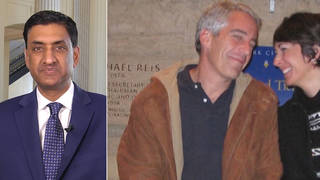
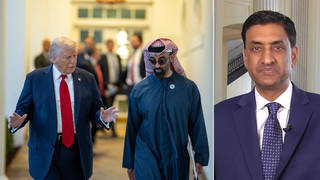
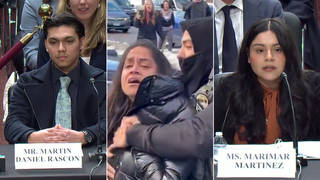
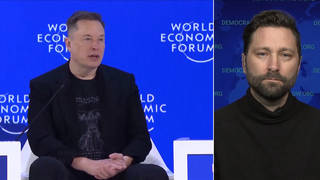







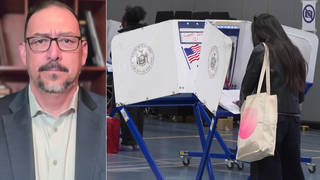
Media Options